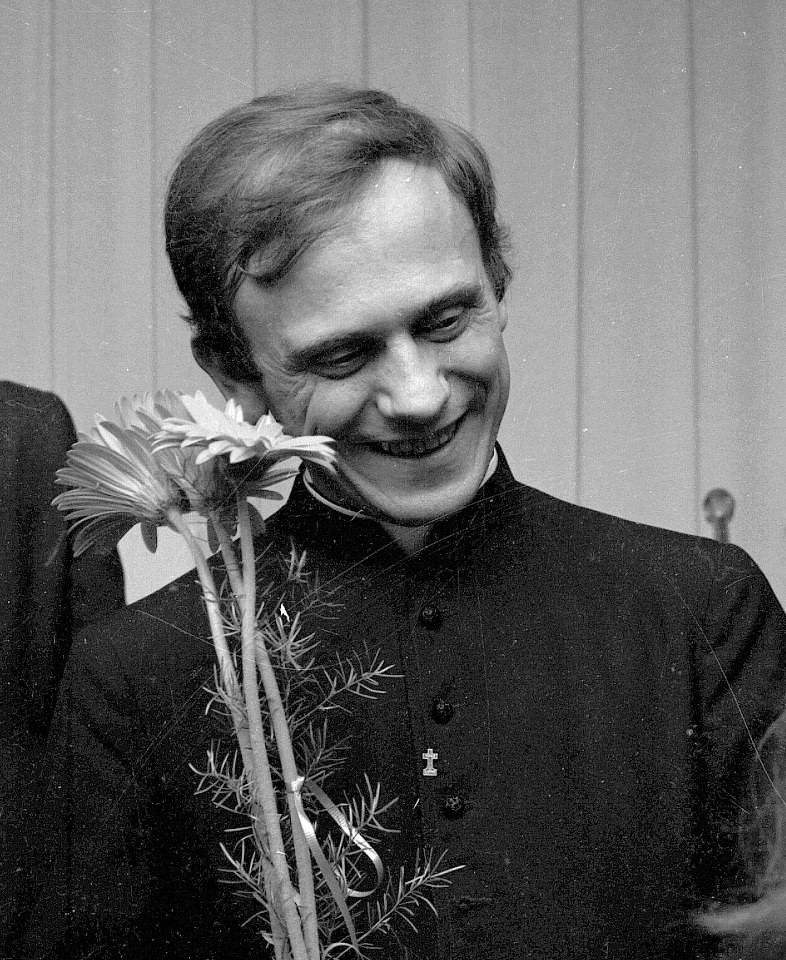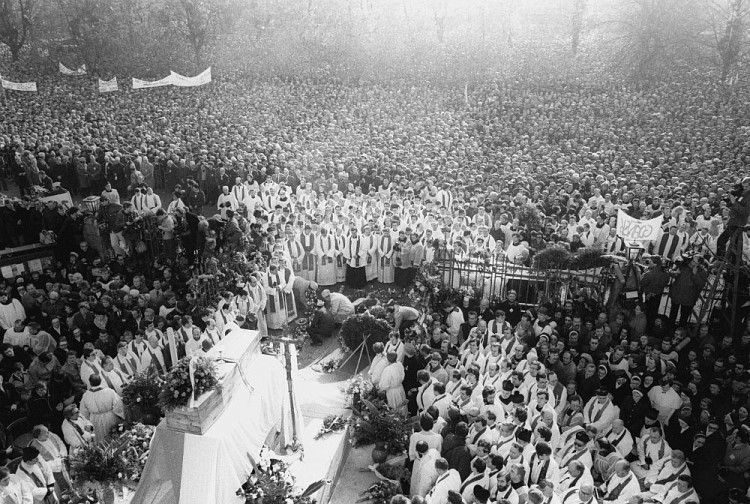“Conquer Evil with Good”
In the summer of 1986, as 20-year-old seminarian, I traveled for two weeks all over Poland with a large group of French scouts visiting religious shrines and historical towns and places. I was greatly surprised that they wanted to visit a small village north of Warsaw named Okopy. We stopped there for one reason: to meet an old couple. They were the parents of Father Jerzy Popieluszko, a Catholic priest brutally murdered by the Polish communist secret police two years earlier, while I was a high school senior. Although the scouts were eager to speak with them, at the same time I noticed their trepidation. What does one say to people whose son was brutally killed?

The parents of Father Popieluszko welcomed us cordially in front of their modest farmhouse, and they were pleased to speak of their murdered son. Their tremendous suffering was evident. Nothing, not even their publicly expressed forgiveness for the murderers, was able to remove the signs of pain from their faces. All we could do at that moment was to show our sympathy and deep respect for them.
The People’s Priest
During communist rule in Poland, the government was responsible for the murder of several priests, but Father Popieluszko’s case was the most notorious. He was a chaplain of the “Solidarity” trade union that started in August of 1980. It was more a social and political movement at that time than a mere organization. “Solidarity” ignited the dismantling of the communist system in Central and Eastern Europe and finally in the Soviet Union itself – a system, the likes of which mankind has never seen.
Father Jerzy’s work as a chaplain far exceeded the standard work of any chaplain as he traveled all over Poland celebrating masses for workers and organizing help for persecuted people. But his greatest and maybe his most precious service was to give hope to those who had lost it. Although the regime did everything to separate him from the people and limit his influence, he was very well known and respected.
In his homilies, Father Popieluszko openly expressed the things which workers and intelligentsia were not able to say out loud: the demand for political and religious freedom and for a just social system. However, he never called for revenge or bloody revolution. It was just the opposite. He continuously repeated St. Paul’s famous words: “Do not be conquered by evil but conquer evil with good.” (Rom 12:21) This seemed to be so dangerous to the Polish regime that it was determined to silence him once and for all.
In the Waters of the Vistula River
In communist Poland, a special department of the secret police was created to monitor, investigate and demolish the Catholic Church. The Church was the biggest and the last obstacle to the regime in executing unrestricted power over the people. Father Jerzy’s work was considered especially obstructive for the Communists. Several officers of the secret police were assigned to remove that “danger.” They tried several methods to achieve this goal. Somehow, they tried to force him to collaborate with them. Later, they tried to bribe him by offering him studies abroad. And finally, they tried to frame him with the possession of drugs, explosives and pornography — the standard repertoire in eliminating opponents in any regime. When these methods failed, they decided to eliminate him permanently. After two attempts to assassinate him by car accident, the parishioners hired a driver to be his bodyguard. This gave Father Popieluszko some protection but proved to be insufficient. On the night of October 19, 1984, while returning from celebrating Mass in Bydgoszcz, he was captured by the secret police and horribly tortured. He was tied with ropes around his neck, legs and arms, shoved into a plastic bag and thrown into the Vistula River in Wloclawek, barely six miles from the seminary I attended. His killers tied a 22-pound weight to his leg. He was only 37 years old.
To this day we do not fully know why the communist authorities decided to acknowledge this murder and sacrifice the four officers who kidnapped the priest. The trial of the murderers was a bizarre spectacle since all the parties involved were completely controlled by the Communist party. Sometimes even the prosecutor seemed to play the role of public defender of the murderers as he nearly equated the victim to his oppressors. Unsurprisingly, the trial did not reveal all the circumstances of Father Jerzy’s murder. The names of the people who were really responsible for that murder are not known to this day.
The four officers who murdered Father Jerzy were sentenced to 16 to 25 years in prison but served only a fraction of their terms. After their release from prison, some of them changed their names and appearance through plastic surgery. The unit leader of the kidnapping did not change his identity or his hatred of the Catholic Church. He has even written several articles for an ultra-anticlerical magazine.
The Martyr’s Triumph
Father Jerzy’s death raised a wave of protest in Poland and increased the determination of the Poles in their fight for religious and political freedom. The now famous priest was buried in front of St. Stanislaus Kostka Church in Warsaw, an exceptional privilege not known in the modern history of Poland. An estimated crowd of half a million people attended his funeral on November 3. The story became well known in Europe and throughout the world. Soon thereafter, it became a custom for foreign non-Communist government delegations visiting Poland to place a wreath on Father Popieluszko’s tomb, which has been infuriating the communist regime.
In 1997, Cardinal Joseph Glemp, Archbishop of Warsaw in Father Popieluszko’s native diocese, started the beatification process of the “Solidarity” chaplain. He stated that the priest’s death was a clear example of martyrdom considering that he was aware of the danger and could have easily resigned from his work. In fact, Father Jerzy could not resign. His understanding of the priestly vocation compelled him to remain with the people and to be faithful to the truth– a truth, he believed, that would ultimately triumph.
His death strengthened the faith of many people; for some, it was instrumental in their conversion. It exemplified Tertulian’s famous sentence: Sanquis martyrum – semen christianorum, “The blood of martyrs is the seed of Christians.” To this day, his tomb has been visited by more than 24 million people.

In December 2009, Father Popieluszko’s beatification process came to its finale when Benedict XVI declared him a martyr. Two months later, the day of beatification was celebrated on June 6, 2010 — the day of a new Polish Church feast – the Feast of Thanksgiving. The beatification ceremony took place in Warsaw’s main square, Pilsudski Square. In this very same place, once named Victory Square on June 2, 1979, John Paul II proclaimed his famous prayer: “Let Thy Spirit descend and renew the face of the land! This land!” The first part was a citation from the Bible; the addition “this land” came from the pope himself. The message of this prayer was clear.
After the beatification mass celebrated by Archbishop Angelo Amato, Prefect of The Congregation for the Causes of Saints, the procession with the relics of Fr. Popieluszko proceeded along Warsaw’s main historical road, known as the Royal Route, to the Church of God’s Providence in Wilanow, a southern neighborhood of the Polish capital. The newly created church was originally planned more than two centuries ago, but the partition of Poland, World War II and the communist occupation delayed its creation. In this procession, citizens of Warsaw and of Poland gave homage to this modest priest who was “not afraid of those who kill the body but could not kill the soul.” (Mt 10: 28)
Although Fr. Popieluszko struggled with a communist regime in Poland that has now been defunct for more than 30 years, he is surely a saint for our times. He stands as an example of a person with a strong moral character and clear goals for his life — things not easily found in the contemporary world.
Fr. Mark Jurzyk
